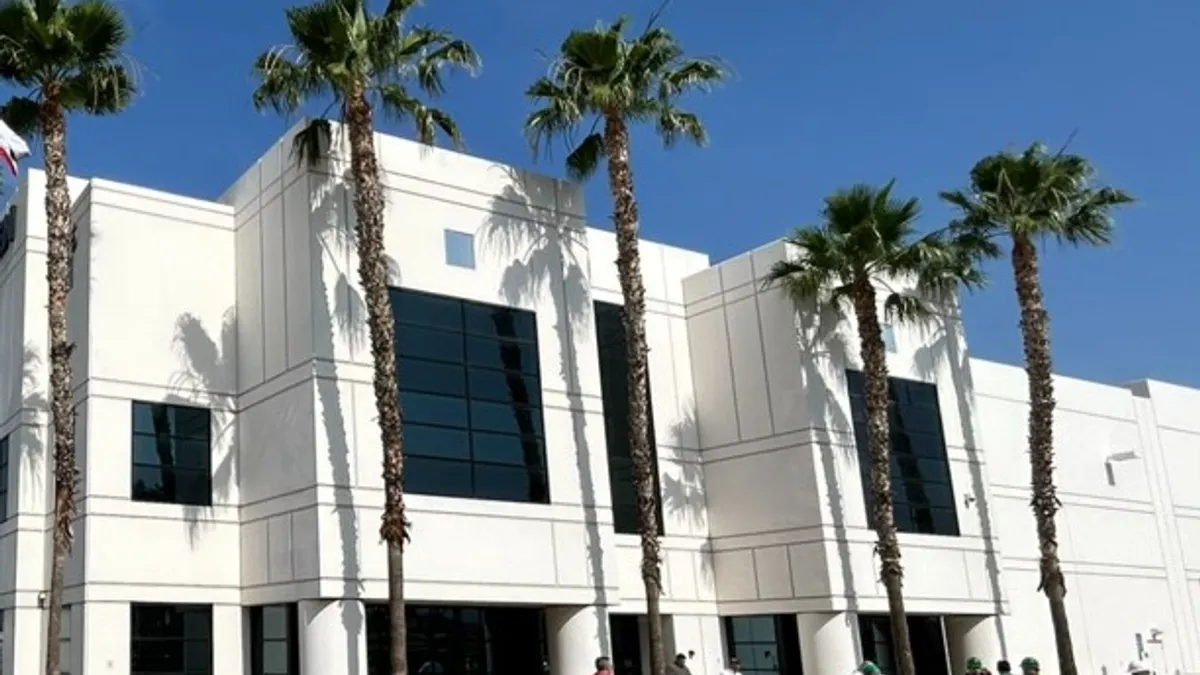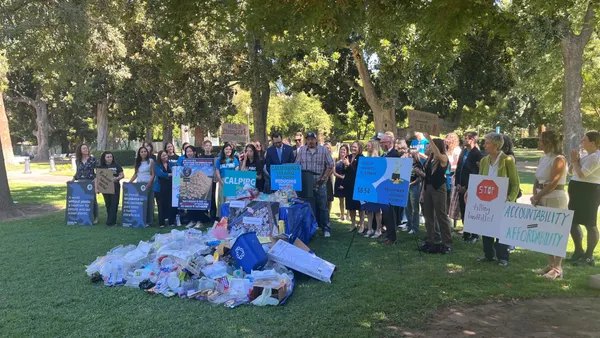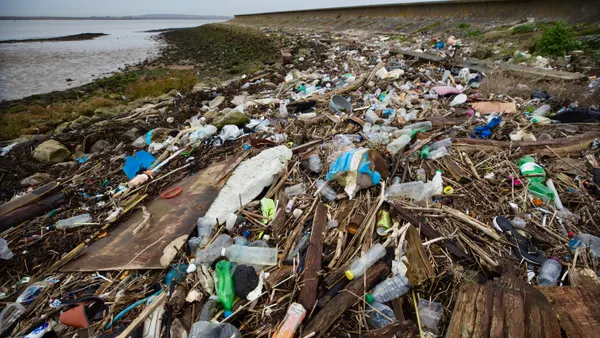Dive Brief:
- Blue Polymers, a joint venture between recycler Republic Services and distribution company Ravago, is now producing food-grade recycled PET out of a facility in Southern California. It closed the acquisition of that facility from Evergreen Recycling on Aug. 1, according to a Republic spokesperson.
- Republic will continue to provide some flake from its Las Vegas polymer center to make pellets in California, as it did when Evergreen owned the facility, explained Pete Keller, vice president of recycling and sustainability at Republic Services. Blue Polymers expects to have a similar customer base as Evergreen, with the rPET largely going to beverage bottles.
- With the Southern California acquisition, “It's a continuation of the investments we made, but it also allows us to address a different subset of customers,” Keller said. “Whereas we sell flake to folks that create pellets, now we can sell pellets to folks that create packaging.”
Dive Insight:
In recent years, Republic Services has been taking steps to address growing demand in the U.S. for recycled plastics, sparking interest from customers such as Coca-Cola and Circularix. It’s helping to meet this demand through both its own polymer centers and its separate Blue Polymers joint venture. These facilities are designed to help process rigid packaging.
Republic opened its first polymer center in December 2023 in Las Vegas. A second one opened in Indianapolis this year, and the company recently disclosed it’s adding a third location in Allentown, Pennsylvania. These sites are owned entirely by Republic and consume all grades of curbside-collected plastics from Republic’s own recycling centers, Keller said. They largely focus on PET, PE and PP. They produce clear, hot-wash PET flake, and high-quality food, non-food and color-sorted bales of ethylene and propylene, Keller said.
Separately, Republic and Ravago teamed up in 2023 to create Blue Polymers, with a 45% and 55% ownership split, respectively.
Historically, the Southern California facility was a bale-to-pellet operation, and the previous owners recently converted it to flake-to-pellet, Keller said. Republic didn’t have experience making pellets, but Blue Polymers does. Now, Blue Polymers is continuing to produce FDA-approved food-grade rPET for customers, he said.
The California location is especially advantageous given the state’s minimum recycled content standards. 2020’s AB 793 stipulates that most plastic beverage containers must contain 25% PCR as of 2025 and 50% come 2030. “There's a regulatory framework that supports the investment thesis,” Keller said.
The facility is not far from Republic’s Las Vegas facility, allowing Republic to transfer flake to the California site. “Ultimately, a lot of that stuff's going to end up in packaging on shelves in California, because of the public policy, and just because of the demand in that marketplace. It's a massive marketplace,” he said. Even prior to the acquisition, Republic was moving some flake from Vegas to that facility to become pellets.
Blue Polymers was already selling food-grade pellets from its Indianapolis facility. “So a lot of the customers that consume ethylene or propylene for the packaging also are interested in PET. So it's an extension of Blue Polymers’ product line offering to the marketplace,” Keller said.
Five months after getting up and running, the Indy facility has caught up with Vegas operationally, Keller said, thanks to earlier lessons. Leveraging what he called the newest recycling equipment in the U.S., “the quality of the flake is very high, and the demand for the offtake has also been very high,” Keller said.
Republic is now looking ahead to its Northeast expansion with the upcoming Pennsylvania polymer center.
“We've always talked about building a national network to support our 80 recycling centers. So certainly the Northeast has to be part of the equation,” Keller said. Republic needed a site of about 10 acres near highway infrastructure. The company intends to begin installing equipment in the first half of next year and become operational in the first half of 2027.
“There's a lot of conversion capacity, there's a lot of extrusion capacity, and there's a lot of bottlers, obviously, in that part of the country. So it's a great location,” he said.












